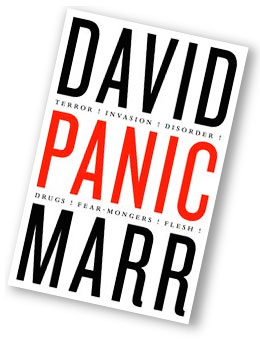FEATURE ARTICLE -
Book Reviews, Issue 58: Dec 2012
David Marr is one of my go to journalists when a story of some drama and importance breaks across the Australian political and social landscape.
Marr seems to follow an ancient rule of journalism, one that is often lost in the mist, namely, to provide some interesting information on the topic under discussion.
It is astonishing how recourse to the original documents; the establishment of a basic timeline; or even gaining an account from someone involved in the action can add something to the press release and the file footage.
In Marr’s excellent book on the Tampa, written with Marian Wilkinson, Dark Victory, we hear, as part of the chronology, from the refugees themselves how they felt as they sat on the deck waiting to find out what was to happen to them. In Panic, we hear from Ahmed Ali Al-Kateb, as he works as a draftsman in Canberra and tries to put his life together after having seen the High Court bless eternal detention in the case which bears his name.
Panic is a collection of Marr’s articles from 1997 to the end of 2011. The title captures the theme which guided their selection: the fear of a large section of the public, carefully fanned by politicians for their own advantage, assisted by the shock jocks of the media, equally clearly for their advantage. Or as Marr, in its introductory chapter, calls the articles: a few dozen dispatches from the republic of panic.
The articles are given updates and context. They stand, however, on their own feet, as relevant and interesting as the day they first appeared in newsprint.
Since I am already a fan of Marr, reading the articles is like visiting old friends after a long gap. There is the joy of recognition, the pleasure of revisiting old conversations. Some, I missed at the time. What was I doing that week, I think, that I missed the joy of reading this wonderful piece.
A decade and a half of recent history aids reflection. So many panics have we been put to. The different morphs spill from the chapter list. Pauline Hanson and her fear of Asianisation; the Wik decision and the fear of losing backyards; the fear of drugs (of all kinds); Lebanese on Sydney beaches; the fear of reading the truth about broadcaster Alan Jones, himself, the arch spreader of fear; Bill Henson’s photos; fear of unelected judges; and, throughout the whole period, the fear of people messing about in boats in our waters.
Each article is a gem. Mentioning one or two amounts to favouritism among offspring. In My Love of Drugs, Marr inserts himself into the story as the framing of what is an interesting history of prohibition starting with the United States occupation of the Philippines at the very end of the nineteenth century and Britain’s change of heart on a drug they fought a war to impose on China. The narrative involves a series of international conventions forcing little countries into the prohibition stance. Most interesting is the hard ball diplomacy used by the United States to stop heroin trials in the Australian Capital Territory.
Prohibition, a dangerous stupidity which has caused deaths of innocents and corruption of most polities, looks even more foolish when examined in its historical context.
And I love Belling the Cat. This discussion of the hostility shown by religious institutions to any proposal for a Charter of Rights rips away the veil and exposes the high minded arguments as just a cover to allow the churches to continue to discriminate on moral and religious grounds among all of their tens of thousands of employees. And, looking back, it is ironic that the two great opponents of the Brennan Charter, the Murdoch press and the Catholic Church are looking less like what you might ask of an opinion leader with each passing inquiry.
I listened to ANU academic William Maley of the Asia-Pacific College of Diplomacy speak recently. He provided me with two interesting footnotes to Marr’s repeated discussion of the repeating public drama over asylum seekers who arrive by boats that has unfolded over even longer than the 14 years covered by Panic.
Maley pointed out that Nauru and no advantage is not about preventing tragic drownings. It is about stopping tragic drownings inconveniently close to Australian shorelines. Asylum seekers, if they are forcibly deterred from seeking refuge in Australia, will die on more dangerous land routes north or drown in places like the Mediterranean. Our politicians want asylum seekers to die quietly a long way away from us.
Maley also pointed out that, as much as we might like it, people seeking refuge is not a problem we can wish away by being as cruel as we dare. He foreshadowed that, as the United States and its allies withdraw from Afghanistan, ethnic strife will be unleashed and much larger numbers of asylum seekers will be fleeing from torture and a variety of alternative forms of violent death. That wave will take decades of tabloid headlines and macho political stances to subside.
The lesson is, perhaps, that our propensity to be panicked for political reasons is more than some unfortunate kind of political immaturity. It hampers our ability to plan for and deal with the present and the future. If we had dealt with those coming to our shores seeking asylum, maturely, two decades ago, and not beat up what have been tiny numbers, we might have built a much more robust regional and international system to place some of the tiny proportion of the world’s refugees who come our way.
We might have prevented death on the seas
Creating panic may be fun for some and useful for others in the short term. Dealing with reality is always more productive in the long run.
Stephen Keim
Chambers
11 December 2012



